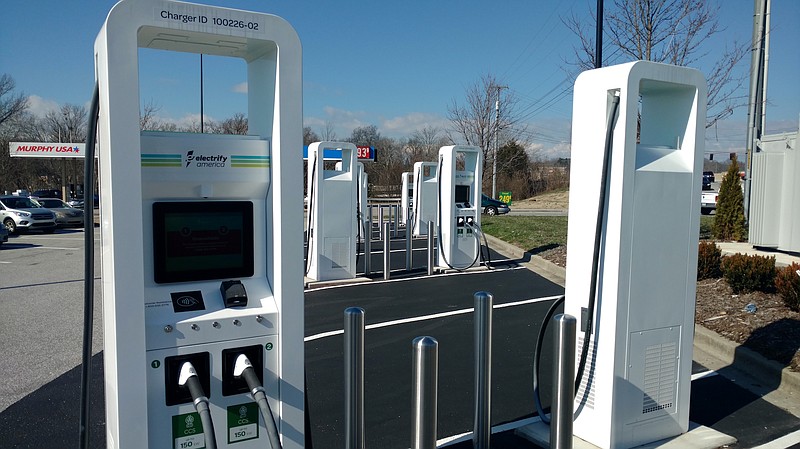ELECTRIFY AMERICA
Charging stations in the Southeast Tennessee area:* Wal-Mart, 5588 Little Debbie Parkway, Ooltewah* 920 Hillsboro Blvd., Farrar Place, Manchester, Tenn.
When Volkswagen's planned Chattanooga electric vehicle plant starts cranking out SUVs in the future, buyers can fuel up at a network of charging stations VW is building across America.
"Range confidence is probably the biggest thing an EV owner wants. People want to have this as their vehicle. They're not looking for a highway vehicle and for a local town vehicle," said Mike Moran of VW subsidiary Electrify America.
Already, Electrify America plans to have 484 power stations, with more than 2,000 charging dispensers, installed or nearly so across the country by mid-2019. One in Hamilton County opened last year at the Ooltewah Walmart.
Electrify America began its build out in 2017 when VW agreed, as part of its settlement with the EPA over the diesel emissions scandal, to spend $2 billion in EV infrastructure and education over 10 years.
Moran said the stations are part of the first $500 million in spending, with the remainder coming in three other increments by 2027. Also, Electrify America plans to install more than 2,800 workplace and residential charging stations by mid-2019 in 17 of the biggest metro areas of the country.
Still, the infrastructure isn't without glitches.
Just last Friday, Electrify America said it was temporarily shutting down the majority of its high-powered 150- and 350-kilowatt electric chargers due to a potential manufacturing defect with the liquid-cooled charging cables.
Moran said the supplier experienced one incident in Europe at a private facility in which no one was injured. But the supplier wanted to stop usage worldwide to investigate, he said. Moran said he's hopeful the affected units will be back operating quickly.
Moran said the biggest concern among EV drivers is the worry they won't get to their next travel point before running short of power.
"If we provide a network that reduces anxiety and also if we make sure the [charging] experience is concluded quickly, it's an important part of what EV owners want and what EV manufacturers need in this country," he said.
Electrify America offers 50-, 150- and 350-kilowatt chargers. More EVs are being manufactured to handle the ultra-fast charging from the 350-kilowatt units, he said.
For example, Porsche Cars North America, also a VW subsidiary, announced an agreement to provide the first all-electric Porsche, the Taycan, with three years of charging at Electrify America public stations across the country. The charging benefit will be included in the price of the Taycan, according to Porsche.
The Taycan, slated to arrive in late 2019, will add more than 60 miles of range in four minutes – the fastest in today's auto market, the company said
Volkswagen Group of America CEO Scott Keogh, who will oversee construction of the $800 million EV plant in Chattanooga that has a planned 2022 startup, said he's confident in what's happening with the charging station network.
"Infrastructure-wise, I feel pretty good what Electrify America is doing and what it will continue to do," he said.
Moran said Electrify America is an open network, with its stations offering charging connectors working with virtually all vehicles, not just VWs.
The cost is $1 to connect and then between 30 cents to 35 cents per minute, depending on the area of the country, he said.
Also, users can pay by credit card. Soon, buyers can install an app in which motorists can monitor on their phones how quickly their vehicles are charging while they're getting coffee or a bite to eat, Moran said.
He said Electrify America has agreements with 130 Wal-Marts countrywide to install the chargers in addition to numbers of Target stores and shopping centers.
"A couple of main things consumers said when they were surveyed is convenience and time," Moran said.
The entity has sought comments to help guide the company's next set of investments, though the second phase of charger installations is expected to deploy hundreds of additional charging sites beginning in July 2019.
Contact Mike Pare at mpare@timesfreepress.com or 423-757-6318. Follow him on Twitter @MikePareTFP.
